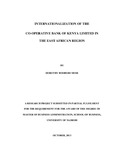| dc.description.abstract | In existing international business literature and theories, mature multinational
corporations play a dominant role, whereas banks and their internationalization
processes have only recently attracted broader interest from researchers. This is
evidenced in several countries, particularly those that have experienced a balance
of payment deficits, have attempted to increase the international business
activities of their banks. The theoretical framework ha studied several mainstream
internationalization theories, mainly from the perspective of banks: models, early
internationalization theories and international business. Internationalization in the
banking industry is of considerable relevance owing to the observed growth
effects and their demonstrated capacity to drive the economy at national, regional
and global levels. Banks are using internationalization as a tool for growth and
sustainability. Banks are diversifying into foreign markets to spread risk. The
main reason for banks going international is the need for them to stay competitive
in their respective environment. The study incorporated government related issues
for example tax regulation, labor laws and regulatory framework in the countries
where banks expanded greatly and how the regulations affected the
internationalization process. The study recommends that banks seeking to
internationalize need to consider some factors prior to embarking on the
internationalization process as well as evaluate the legal and regulatory frame
work within the region in which they are to expand.In order to better understand
and help to describe banks internationalization process, the methods by banks
internationalize have also been studied and contrasted. The source of data was an
interview guide. An interview guide was employed as the sole research
instrument. The researcher used the interview guide to aid in obtaining
information from the respective respondents who were the top management staff
that were well conversant with the banks’ operations. Qualitative research
analysis was used which is fundamentally interpretive and interpretation which
represents personal and theoretical understanding of the phenomenon studied. The
study incorporated data display, including graphs and charts. | en |

